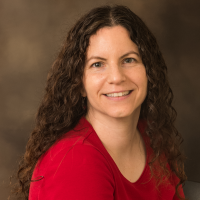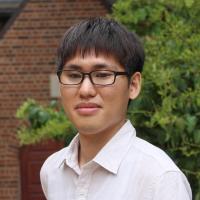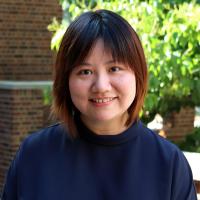iSchool faculty are studying ways to improve user experience, with a common goal of improving technology and applications for the needs of individual users. These researchers are working with diverse groups to gain feedback, and several current projects are focused on experiences for users with disabilities.
"Good interface design is actually a social justice issue," said Professor Michael Twidale, an expert in interface design and evaluation.
Twidale's research examines issues that arise when people are in the process of learning something new. For one project, his group built a "confusometer" box for users to rank their confusion level as they learn.
"Typically, people don't go through training courses, especially for applications we use in our nonwork lives—like those used for online banking, buying things, filing taxes, or booking medical appointments. Most of us do okay, but still we often get frustrated and confused," he said.
Twidale also studies how people learn to use voice user interfaces, such as Amazon's Alexa and Google Home.
"We are looking at the metaphors that people use implicitly and explicitly to make sense of a new device that they welcome into their home and their lives. Is it like a person? If so, what kind of person? A butler? A secretary? Or is it like something not human? We found that people use different metaphors for different use contexts," said Twidale.
Metaphors are powerful for making sense of unfamiliar technology, but some metaphors are misleading and others can be negative in what they imply. According to Twidale, by understanding how people learn and what causes them to become confused, we can design new applications that are easier to learn.
Associate Professor Rachel Adler, whose research interests include human-computer interaction and accessibility, is working on designing mobile health applications for and with people with disabilities. In one project, her team is designing an app to empower cancer survivors with disabilities.
"We co-designed the application together with cancer survivors and found that they wanted an app that encompasses flexibility, engagement, socialization, and a minimalistic design," she said. "Further, they also provided tips for improving accessibility, such as using larger font sizes and icons."
Associate Professor Yun Huang's group is dedicated to innovating AI-based solutions that cultivate a synergistic relationship between humans and machines.
"One of our projects involves designing emotion AI collaboratively with deaf and hard-of-hearing learners, rather than solely for them, to enhance their online learning experiences," said Huang.
Her group is designing AI-based solutions that can help speech and language pathologists handle mundane tasks such as note-taking during therapy sessions, so that they can focus on student engagement. The researchers are also working on SafeRBot, a conversational agent system that enables community members to send safety incident reports efficiently.
"Our system [SafeRBot] not only reduces the barriers for people with diverse backgrounds and communication challenges to access reporting services but also improves the quality of incident reports. This is crucial for maintaining a safer community environment and building relationships between the community and safety service providers," she said.
Associate Professor Yang Wang and his collaborators are building an online platform and process for users—particularly those with disabilities—to better engage them in governing AI systems.
"We built an online platform and a process that can better engage these underserved users to influence the decision-making on AI behavior," said Wang, whose research focuses on privacy and security. "This could improve user experience of these underserved populations because their preferences could be better incorporated into the systems."
Working in the areas of accessible computing, universal design, and equitable healthcare technologies, Assistant Professor Jooyoung Seo and his group want to make data science more accessible for blind and visually impaired individuals.
"Our team is working to add different encodings to data visualizations, such as spatial audio, tactile representations like Braille, and, recently, AI and large-language models (LLM) for graph auto-description," said Seo. "By integrating various modalities, our goal is to enable blind and low-vision users to enjoy data representations alongside sighted people. Our tool makes it easier for them to understand and access related concepts."
Assistant Professor Jessie Chin is studying the ways in which older adults interact with computers. One of her group's projects demonstrated that older adults are more likely to attribute human characteristics to AI conversational agents, rating the agents as being more usable, intelligent, and pleasant if they asked the questions instead of researchers.
"By understanding user experience, we will be able to create a more enriching interaction experience for older users and propose new opportunities to utilize technologies to support independence and well-being as we age," said Chin, whose research focuses on health informatics.
Internationally recognized for his research in human computer interaction and information behavior, Professor Christopher Lueg has a special interest in embodiment—the view that perception, action, and cognition are intrinsically linked—and what it means when designing for others.
His interest in embodiment informs his work to advance out-of-clinic and hospital medical consultations using mobile remote presence bots. The camera-equipped devices would visually connect caregivers with patients who are at another location. Not limited to health contexts, these devices could also offer people who cannot travel access to cultural sites, such as galleries, museums, and historical landmarks.
"User experience is a lot about acknowledging that we are all different both in terms of our physical bodies, our abilities, and our perception," said Lueg. "To me, good usability is a small and very do-able contribution to making the world a better place."






